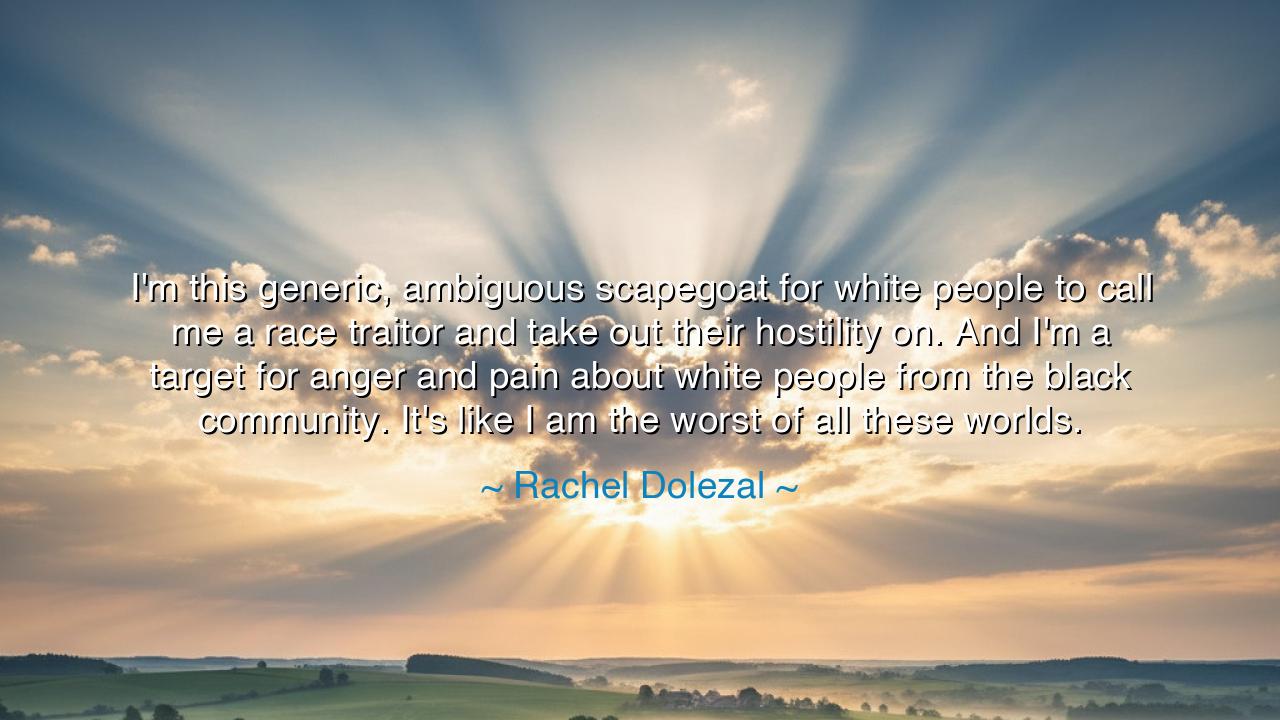
I'm this generic, ambiguous scapegoat for white people to call me
I'm this generic, ambiguous scapegoat for white people to call me a race traitor and take out their hostility on. And I'm a target for anger and pain about white people from the black community. It's like I am the worst of all these worlds.






Host: The room was quiet, a soft hum of the outside world just beyond the window, as the evening settled into a calm rhythm. Jeeny sat at the table, her fingers tracing the rim of her cup, deep in thought. Jack, standing by the window, looked out at the darkened world, his mind clearly absorbed in the weight of the words just shared. The air between them was charged with an unspoken understanding, as if the conversation was about to turn toward something more complex.
Jeeny: (breaking the silence, her voice calm but serious) “I came across something by Rachel Dolezal today that really made me think. She said, ‘I’m this generic, ambiguous scapegoat for white people to call me a race traitor and take out their hostility on. And I’m a target for anger and pain about white people from the black community. It’s like I am the worst of all these worlds.’ What do you think about that?”
Jack: (pauses, his voice thoughtful) “It’s a powerful and painful statement, isn’t it? Dolezal is describing the complexity of her position—how, in some ways, she’s a symbol for the racial divide, the discomfort that both white and black communities feel about her identity. She’s caught between two worlds, neither of which fully accepts her, and she becomes the target of resentment from both sides. It’s a reflection of how difficult it can be to navigate racial identity, especially when you don’t fit neatly into society’s rigid boxes of what it means to be black or white.”
Jeeny: (nodding slowly) “Exactly. She’s pointing out that no matter how she identifies or how she tries to engage with either community, she is seen as an outsider—someone who doesn’t belong in either world. In the white community, she’s seen as a race traitor, and in the black community, she’s viewed as inauthentic. It’s heartbreaking because she’s essentially being rejected by both sides, forced to bear the weight of a complex racial identity that society isn’t equipped to understand.”
Host: The stillness in the room deepened as the conversation continued. Jack turned slightly toward Jeeny, his expression softening as he considered the broader meaning of Dolezal’s words. Outside, the world had quieted, but inside, their conversation had shifted inward, reflecting on the complexities of racial identity, acceptance, and society’s expectations.
Jack: (his voice quieter now, more introspective) “What strikes me is the way she describes being forced to be the scapegoat. No matter what she does, no matter how she identifies, she’s going to be blamed and targeted. It’s like society sees her as an example of everything that’s wrong with race relations—a symbol of confusion or appropriation. The frustration in her words is so clear. She’s a person struggling to find herself in a world that doesn’t know how to accept complexity.”
Jeeny: (softly) “Yes, and I think it speaks to the narrowness of how we view race. We want to fit people into categories—black or white, and if someone doesn’t fit that mold, we struggle to know where they belong. Dolezal’s experience shows the limits of those categories and how they can be so harmful, not just to people who don’t conform, but to society as a whole. We’re all human, with overlapping experiences, but the way race is often constructed doesn’t leave room for that complexity.”
Jack: (nodding slowly) “Exactly. And it’s painful to realize that Dolezal’s struggle isn’t just about her. It’s a reflection of the larger issue of how race is perceived and divided in society. People are constantly forced to pick sides, to define themselves in relation to these rigid categories, and when they try to exist outside of those boundaries, they’re punished. It’s a reminder of how identity—especially racial identity—is something that society imposes on us, rather than something we can freely define for ourselves.”
Jeeny: (smiling gently) “Yes, and I think it’s a reminder that no matter where someone falls on the racial spectrum, empathy and understanding are needed. People shouldn’t be reduced to labels or rejected based on perceived authenticity. What’s authentic is how a person chooses to live their truth, not how society defines them.”
Host: The quiet between them grew deeper now, as the conversation unfolded. Outside, the world had quieted, but inside, there was a shared understanding about the complexities of racial identity, acceptance, and society’s limitations in understanding those complexities. Jeeny and Jack had uncovered a deeper truth in Dolezal’s words—that the experience of living in the margins of society’s racial categories can be painful, isolating, and frustrating, but it also reveals the arbitrary nature of those categories and the need for a broader, more compassionate understanding of identity.
Jack: (smiling softly, his voice more assured) “It’s a reminder that identity is more complex than society’s boxes. We need to create spaces where people can be authentically themselves without fear of rejection or judgment.”
Jeeny: (nodding warmly) “Exactly. It’s about creating a world where everyone has the freedom to define who they are, without feeling the weight of societal expectations or limitations.”
Host: The world outside had quieted to a peaceful stillness, but inside, the room was filled with understanding. Jeeny and Jack had uncovered the deeper meaning in Dolezal’s words—that the experience of racial identity is complex and fluid, and society’s expectations often fail to capture that reality. The night continued outside, but inside, the room felt full of the realization that empathy, understanding, and freedom are essential in allowing people to define and live their true identities, without the constraints of societal categories.






AAdministratorAdministrator
Welcome, honored guests. Please leave a comment, we will respond soon